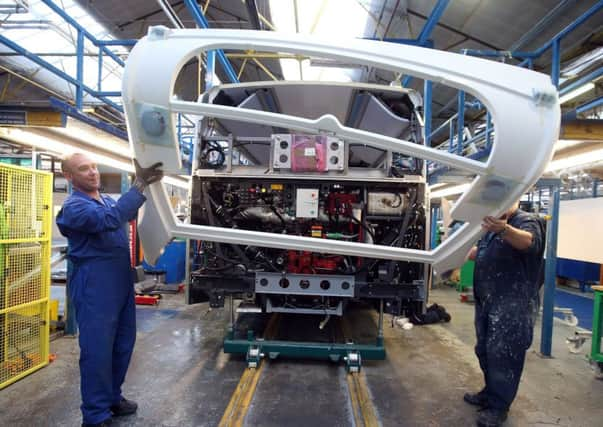Wales, not Scotland, in main Brexit firing line
This article contains affiliate links. We may earn a small commission on items purchased through this article, but that does not affect our editorial judgement.


But new research from an independent think-tank says Scotland would definitely not be in the frontline of risk from a “hard Brexit”, with Wales, Northern Ireland and the north east of England all seen as more economically exposed by Britain leaving Europe without a replacement trade deal.
Advertisement
Hide AdAdvertisement
Hide AdThe independent cross-party think-tank Demos rates the relative economic risk to Scotland as “low” in terms of losing EU workers and loss of exports of goods to the single market.
Tom Startup, senior researcher at Demos, said: “About five per cent of Scottish workers are EU nationals, which is fairly average in comparison with other regions. London is an outlier, with one in six workers from the EU. We don’t know the reason for the Scottish figure but it could be that entry points [for EU workers] tend to be in the south of England.”
The research also says 45 per cent of Scottish exports go to the EU, also pretty average UK-wide, but put into sharp perspective by the 67 per cent of Welsh goods that go to the single market. It also compares with figures of 55 per cent from Northern Ireland and more than 60 per cent from the north east England.
“We are not saying there are no risks to Scotland of leaving the single market by any means, it will have implications, but it’s not as serious a situation as some other places in the UK,” Startup said.
There is also the issue of relative current regional dependence on EU “structural funding” to help its poorer areas.
Scotland was due to receive about £1.8 billion in EU Structural Funds over the 2014-2020 period. That amounts to about 0.24 per cent of the country’s Gross Value Added (total output).
By contrast, Wales – which, unlike Scotland, voted in favour of quitting the EU – is by far the greatest UK beneficiary of structural funding. It was due to get a massive £3 billion in EU money in the same period – representing almost 1 per cent of the country’s total output. Northern Ireland and the north east of England also get bigger Brussels subsidies than Scotland.
Advertisement
Hide AdAdvertisement
Hide AdDemos said it assumes the UK leaving the single market and immigration being much lower from the EU, and Scotland also facing tariffs from the EU on goods exports at the current rates facing non-members when we also leave the Customs Union. It also assumes structural funds from the EU will not be replaced by the UK Government.
“It’s going to be difficult,” Startup said. “An awful lot of groups will be clamouring for their funds and subsidies to be replaced. The sudden loss of them from the EU will be a dramatic change.”
Among the various business sectors, the think-tank says manufacturing (particularly dairy products, alcohol and tobacco), agriculture and energy are the post-Brexit industries most in the firing line. It adds that manufacturing will be hit by the choking off of EU migrant labour as one in ten of its workers is currently from across the Channel, while 45 per cent of its exports go there.
There have been anecdotal stories of “armies” of EU workers coming to the UK for low-paid fruit-picking jobs, but the actual amount employed in the agricultural sector is below 7 per cent. More significantly, 70 per cent of UK agricultural exports go to the EU, “which is pretty significant for Scotland,” Startup said.
Demos singles out dairy produce as being particularly exposed to a “hard Brexit”, shouldering what Startup says is the “extraordinarily high” tariff of exports into the EU of 33.5 per cent, a legacy of the EU’s Common Agricultural Policy.
Startup added: “Fish is an important Scottish export. But with tariffs of 12 per cent on entering the EU that could be very significant.” Meanwhile, the UK’s mining and quarrying industry sends 80 per cent of its exports to the single market, though it tends to be a sector with very low tariffs, 1 or 2 per cent.
Startup said it was “no surprise at all” that the Scotch Whisky Association lobbied to stay in the single market ahead of last June’s vote as alcohol and tobacco typically face a tariff for exports there of 19 per cent.
Advertisement
Hide AdAdvertisement
Hide AdThe report says that it has not analysed potential for future UK trade deals outside the EU or the potential gains from being outside the Customs Union, which it says could mitigate the risk factors.
But Startup warned: “New trade deals normally take five or six years. Britain hopes to start talks on them while doing the Brexit negotiations, but we can’t sign them because the EU is still currently running our trade policy. It gives you an idea of the task ahead.”